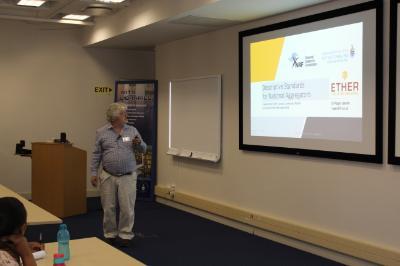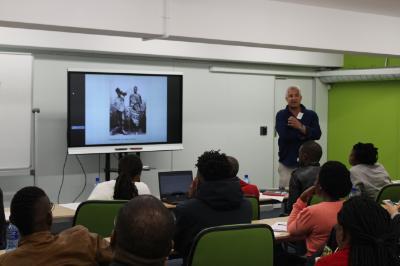
Refresher Training on AtoM
Robert Sobukwe Museum & Learning Centre, Graaff-Reinet, 26-28 February 2020
Following our first workshop at the Robert Sobukwe Museum & Learning Centre in May 2019, this workshop aimed at building on this relationship.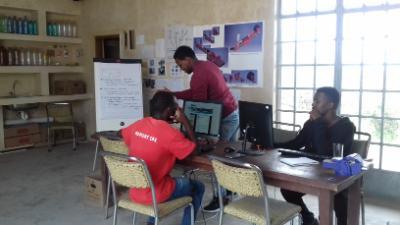
The training needed to consolidate the content on the existing digital repository on AtoM, which we established at our workshop in 2019 and which the NRF Initiative is now hosting – see this link to the homepage Robert Mangaliso Sobukwe Museum & Learning Centre.
The visit provided us with an opportunity to reconnect with staff at the Centre, make additions particularly consisting of archival descriptions for the scrap books, and train new interns which the Centre has recruited at the end of 2019. The outcome of the workshop should enable the intern staff, who are also tour guides for the Robert Mangaliso Sobukwe Museum & Learning Centre, to get to know the website of the Sobukwe digital repository, as well as the Sobukwe collections at Historical Papers, for presentation to visitors. The uploading of audio files for the oral History Research Project will remain a collaborative work in progress.
-----------------------------------------------------------------------------------------------------------------------------------------------------------------
Refresher Training on AtoM
23-24 October 2019, Wits Digitisation Centre, William Cullen Library, University of the Witwatersrand
The workshop was aimed at colleagues from institutions who have recently started using AtoM and needed to consolidate their knowledge about the application, or are wishing to introduce AtoM in the near future. Elements of the workshop included basics and principles of archival description using ISAD(G) standards; an introduction and refresher of basic functionalities on AtoM; and archival fields on AtoM. On Day 2 of the workshop participants had to create an authority record and an archival description of a full inventory, followed by discussion and summary.
The workshop presentation can be downloaded for reference : Wits Library—NRF AtoM 2019
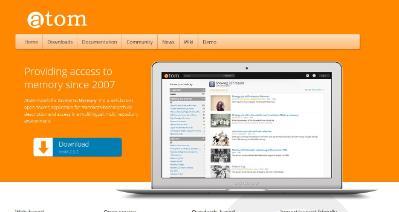
------------------------------------------------------------------------------------------------------------------------------------------------------------------------
5 September 2019, 9.00-16.00, Wits Digitisation Centre, William Cullen Library, University of the Witwatersrand
This 1-day workshop, entitled “Descriptive standards for national aggregators” was presented by Dr Roger Layton, who has a long standing experience in the field of digital libraries, archives and museums and collection management systems, and has been instrumental in the drafting of the National Policy on Digitisation.
The workshop covered the following topics, including an interactive discussion component based on the delegates current situation and future visions:
- Why do we need descriptive standards?
- How we agree on descriptive standards?
- Alternatives available on selecting descriptive standards.
- The universe of items to be described – discipline-neutral vs discipline-specific.
- Syntax standards vs semantic standards.
- Schemas, Vocabularies and Authority files.
- Managing digital repositories: OAIS and Trusted Digital Repositories.
- Exploration of large-scale aggregators: what they do and how they do it.
- Understanding aggregator requirements for data ingest.
- Mapping your data to aggregator standards / Schema-mapping / Vocabulary-mapping / Authority File-mapping.
- Linked Open Data.
- Examining the Europeana as a digital repository including the Europeana Data Model (EDM), and LIDO.
- Envisioning the SA National Aggregator / African Digital Library – what it should do, how it should do it, how to build it.
- The role of the data providers. Gathering data. Preparing data for A maturity model for providers.
- Establishing trust and validity.
- 4IR / AI opportunities in aggregation.
- Example: Our own OneMuseum aggregator for the museum sector, including descriptive standards, ingest support, and the maturity model for future planning.
The workshop programme was structured into four sessions:
- Session 1: more theoretical, providing background knowledge, and citing examples of aggregators, and open questions in moving these forward
- Session 2: exploring descriptive standards in more detail with examples and interactive discussions
- Session 3: providing scenarios which the delegates will engage with in groups
- Session 4: call-to-action both at the national level (how to build and deploy a national aggregator) and at the institutional level (what must we do to ensure that our content is moved up to the aggregator).
The presentation of the workshop is available for reference, and can be downloaded here Descriptive Standards
------------------------------------------------------------------------------------------------------------------------------------------------------------------------
Workshop on Digitisation Project Management & The digital camera as device for digitisation.
24-25 July 2019, Iziko Museums of South Africa, Cape Town, Iziko Study and Iziko Slave Lodge Lecture hall.
The workshop was presented by Mr Azizo Da Fonseca (University of the Witwatersrand, Digitisation Centre) and Mr Antenie Carstens (formerly National Library of South Africa, Cape Town, Digitization).
08-400x266.jpg) Both presentations were geared to address Iziko Museums’ activities in developing a strategy for digitization, and the need to preserve collections on the one hand and to make access available on a national and global basis, on the other hand.
Both presentations were geared to address Iziko Museums’ activities in developing a strategy for digitization, and the need to preserve collections on the one hand and to make access available on a national and global basis, on the other hand.
On Day 1 of the workshop Azizo attended to issues, policy decisions and processes around digitisation project management, drawing from his experience at the Wits Rock Art digitisation centre. Antenie Carstens followed with his presentation by firstly providing a theoretical overview of camera equipment for digitisation and the theory of photography. Day 2 of the workshop continued with the practical session on the digital camera and demonstrations by Antenie.
-----------------------------------------------------------------------------------------------------------------------------------------------------------------------
Workshop at the Sobukwe Museum.
Graaff-Reinet,21-22 May 2019,In memory of Dinilesizwe Sobukwe, who met his untimely death on the 6 June 2019.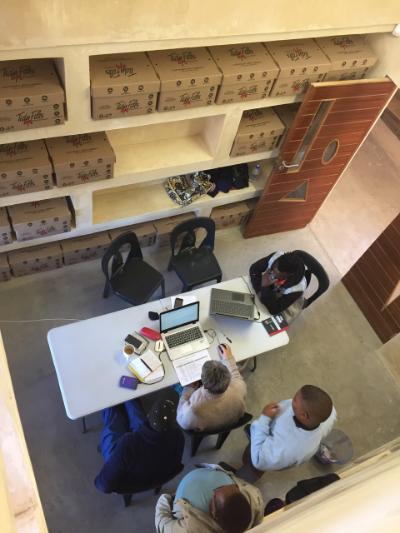
The Robert Mangaliso Sobukwe Trust is a non-profit organization, based in Graaff-Reinet, and was established to preserve and profile the legacy of Robert Mangaliso Sobukwe, founder of the Pan Africanist Congress (PAC). Since 2009 the Trust has worked to establish a museum and learning centre in Sobukwe’s birthplace, uMasizakhe, Graaff-Reinet. A key element of this initiative is the establishment of the Sobukwe Archive. The Museum has since been engaged in a pilot project to initiate the digitisation of the Sobukwe family collection and to create a digital repository on AtoM, initially with the assistance of the Mayibuye Centre.
Following up on these activities, the Wits—NRF Digitisation Initiative undertook to host the AtoM repository for the digital collections from the Sobukwe Trust & Museum, and to train young interns and permanent staff at the Museum on the use of the AtoM instance. The workshop took place on the 21-22 May 2019 at the Sobukwe Museum in Graaff-Reinet. Four staff members and interns, namely Archibald Ntswayi, Vuyokazi Zuma, Courtney Green and Kwanele Cona, were introduced to the Sobukwe AtoM instance by Gabriele Mohale, Historical Papers Research Archive & Wits Digitisation Centre. The workshop covered aspects of preparing archival collections to become a digital collection; basic archival description; introduction to the Sobukwe AtoM instance; the various fields of description on AtoM and how to enter the respective information in the fields of description. Two collections were created, namely “Robert Sobukwe Trust, Oral History Research Project” and “Scrap Books from Robben Island”. Sub-entries were also created where Museum staff can now continue to add both description and uploading digital objects.
The Robert Mangaliso Sobukwe Museum repository on AtoM can be accessed using this link: http://146.141.12.32/robert-mangaliso-sobukwe-museum
____________________________________________________________________________________________________________________________
Digital Curation Workshop.
24-25 April 2019, presented by the renowned South African photographer Paul Weinberg.
From the 24-25 of April, the Wits Digitisation Centre at the William Cullen Library, University of the Witwatersrand, Johannesburg held a Digital Curation workshop, where 31 participants mainly, technicians, archivists, librarians, photographers and heritage practitioners from various institutions around Gauteng took part. The two main presenters were Paul Weinberg and Azizo Da Fonseca.
The workshop was an occasion for the participants to gain insights into copyright issues in the digital domain, scanning, processes and its related equipment, metadata and issues around project management in the preservation of digital objects.
Participants had an opportunity to interact with an array of digitisation equipment held at the Wits Digitisation Centre and at the Ringing Rocks Digitisation Laboratory at the Rock Art Research Institute at the Origins Centre. The corpus of this equipment show cased the various types of materials that could be scanned from books, microfilm and microfiche, slides, photographs, fabrics, maps and other large formats.
From the participants, it was clear that in their respective institutions, regardless of the digitisation stage they were in, all had challenges around equipment, training, IT, funding, and personnel and to an extent in management. Nevertheless, the consensus amongst participants on the workshop, was that the training on the scanning machines was rushed and too short, and there was a need for a more in depth one on one training sessions, and majority felt that there was a need for a follow up workshop.
The content of the workshop and the manner in which it was presented was excellent, and according to participants, an indication of the presenters’ experience and expertise in the field. Similarly, participants were of the idea that managers at their institutions needed to be part of these workshop in order for them to understand the needs for digitisation and its complex processes; from the choice of equipment, hardware, software to standards to follow, best workflows and best preservation standards practiced in the field!
This was with no doubt, a workshop of archivists and individuals alike, exuding tremendous activism, for the preservation of our common heritage for possible perpetuity!
The two cases studies presented at the workshop can be viewed here:
The African Rock Art Digital Archive: www.sarada.co.za
Transnet Heritage Project: http://atom.drisa.co.za/


